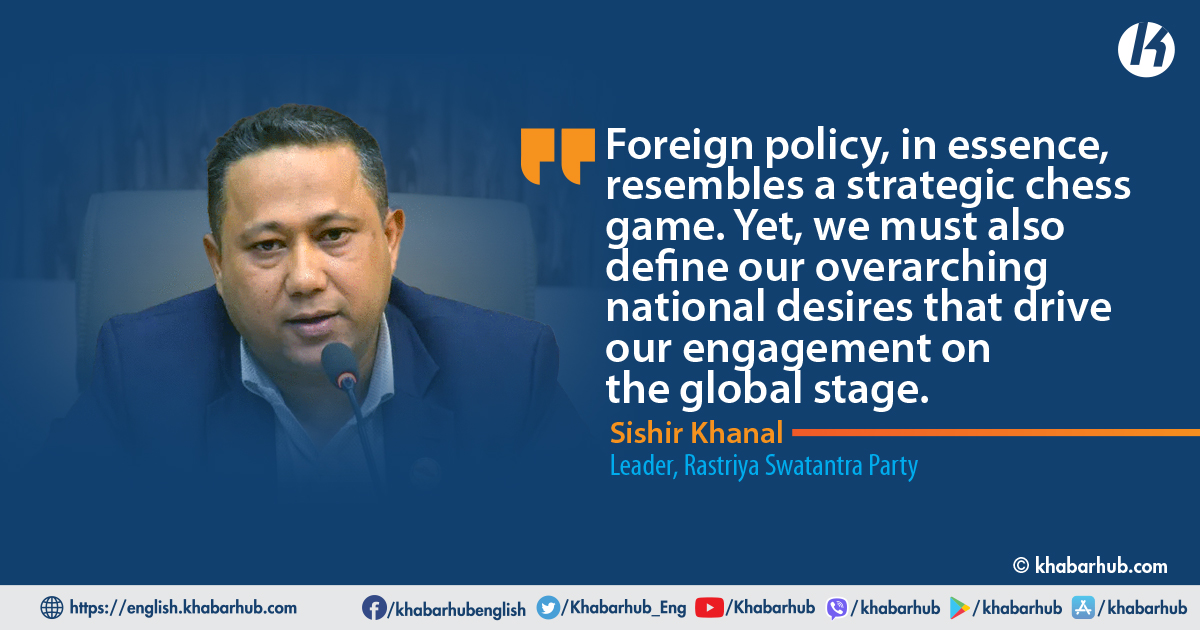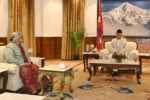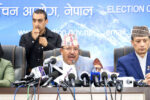We often hear about the concept of a consistent national narrative. However, our nation’s narrative lacks this consistency.
During our upbringing and education, Nepal has often been depicted as a small and impoverished country.
I urge my fellow Nepalis to consider the following: If we were to start a sentence in Nepali, it would frequently begin with “Nepal is a small, poor country.”
In the context of discussing global affairs, particularly when addressing a broader audience, this approach significantly impacts our self-esteem and confidence.
To effectively engage in foreign policy discussions, we must overcome this mindset.
Even in the realm of international relations, our capital remains at a disadvantage.
Consequently, we exert more effort, and this appears to have significantly influenced the development of intellectual and political ideas.
However, this effort doesn’t seem to yield the confidence boost we need. Our recent research reveals our limited influence in this regard.
Situated between two major neighboring countries, and facing highly developed nations beyond, we struggle to establish our value on the global stage, given our status as a representative of an underdeveloped nation.
National security also intersects with sectors like water management. While we emphasize hydropower, the issue of clean drinking water has gained prominence as a crucial aspect of global security.
It’s important to note that not all aspects of our international relations are weak; however, if the foundational elements are weak, the subsequent outcomes won’t naturally be strong.
This highlights that the challenge itself is more significant than what specific challenges we encounter.
What exactly is our national story? Rather than focusing on the potential that lies before us, we tend to recount stories of countless Nepali youths migrating abroad.
These narratives are factual, not fictional. However, my current work with numerous young individuals leads me to feel a deep sense of sadness.
I question why we aren’t discussing our potential and capabilities within Nepal. Instead, our discourse tends to lean heavily towards extreme nationalism.
It appears that we haven’t begun our discourse from the standpoint of emphasizing the value we bring to the world.
Nepal possesses inherent advantages that often go unrecognized. For instance, Nepal provides security to three nuclear-powered nations.
This strategic role, situated between China and India, has not been the subject of direct or indirect discussions.
Nepal’s contribution to providing security, such as the example of the Gurkhas’ involvement in conflict areas like Afghanistan and Iraq, remains largely unexplored.
Through informal conversations with friends in foreign diplomatic circles, I have come to realize that Nepal’s unique strengths are not widely acknowledged.
Our nation has made contributions on a global scale that are unparalleled. We could even be ranked second in the world in this regard, if not sometimes first.
A nation capable of such significant contributions to global security demands more extensive discussion.
This prompts the question: What does the second-ranking country aspire to achieve? How are we shaping our foreign policy to align with these aspirations?
Moreover, we need to define the value we aim to safeguard as a nation, including matters of integrity and sovereignty.
Considering the emerging challenges, these discussions should encompass a wide range of topics.
As we move into an era of new technological advancements, data utilization, and AI innovations, our national security concerns become intertwined with these global developments.
Consequently, our perspectives on issues like the ongoing discourse around China, India, and active politics should be formulated while keeping our neighborly relationships in mind.
The normalization of these issues in the context of our nation’s security underscores the need for careful consideration and strategic planning.
National security also intersects with sectors like water management. While we emphasize hydropower, the issue of clean drinking water has gained prominence as a crucial aspect of global security.
Even now, parts of Madhes struggle to access safe drinking water. Balancing our hydropower strategy with the imperative of maintaining water supply security in the coming decades demands a thoughtful approach.
Additionally, our stance on energy, particularly hydropower, needs clear articulation.
Furthermore, foreign employment has become a vital component of our economy.
This reality cannot be ignored; it’s an integral part of our nation’s landscape.
As we evaluate our position among neighboring countries and consider the United States, our statistical advantages become evident, especially when compared to emerging and semi-developed nations.
In the midst of this complex international arena, finding balance and maximizing our potential remains a multifaceted challenge that demands a comprehensive and well-informed approach.
We must contemplate our trajectory and potential for growth in these areas.
Economic factors also contribute to our global significance as a relatively small nation.
Consequently, our perspectives on issues like the ongoing discourse around China, India, and active politics should be formulated while keeping our neighborly relationships in mind.
Discussions about the metro rail, for instance, evoke questions about Russia’s motivations and intentions.
Even within the dynamic of a few major global powers, how we navigate these relationships is of paramount importance.
Our capacity for effective negotiation and diplomacy is a pressing challenge that must be acknowledged and addressed in our foreign policy considerations.
Foreign policy, in essence, resembles a strategic chess game. Yet, we must also define our overarching national desires that drive our engagement on the global stage.
In the midst of this complex international arena, finding balance and maximizing our potential remains a multifaceted challenge that demands a comprehensive and well-informed approach.
(Opinion based on the speech by Rastriya Swatantra Party leader and parliamentarian Shishir Khanal at a program “Challenges and Opportunities in Nepal’s Foreign Policy” in Pavilion Hall, Kathmandu)









Comment